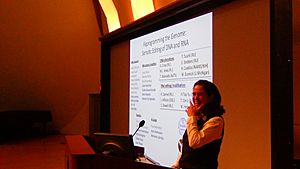Nina Papavasiliou facts for kids
Quick facts for kids
Nina Papavasiliou
|
|
|---|---|
 |
|
| Alma mater | Rockefeller University Oberlin College |
| Awards | Searle Scholar, NIH Director's Transformative Research Project Award, ERC Consolidator Award |
| Scientific career | |
| Fields | Immunology, Molecular Biology |
| Institutions | German Cancer Research Center, Rockefeller University, Yale University |
| Doctoral advisor | Michel C. Nussenzweig |
Nina Papavasiliou is a brilliant scientist who studies the immune system. She is an immunologist and a professor at the German Cancer Research Center in Heidelberg, Germany. She also teaches at the Rockefeller University in the United States.
Dr. Papavasiliou is famous for her work on how our bodies change or "edit" their DNA and RNA. This research helps us understand how our immune system learns to fight off germs and diseases.
Contents
Nina's Journey in Science
Nina Papavasiliou started her science journey by earning a degree in biology from Oberlin College in 1992. After that, she went to Rockefeller University to get her PhD. There, she studied how special cells called B cells learn to recognize invaders.
Learning About Antibodies
B cells make antibodies, which are like tiny shields that stick to germs. Dr. Papavasiliou wanted to know how these antibodies change. This change helps them become super specific, so they can find and fight off different kinds of germs. She continued this important work at the Yale School of Medicine.
What Nina Papavasiliou Researches
Dr. Papavasiliou's research focuses on how living things can change the information in their genome. The genome is like a huge instruction book for every cell. She looks at changes happening in both DNA and RNA.
How Our Immune System Adapts
In 2001, she opened her own lab at Rockefeller University. A lot of her early work was about the adaptive immune system. This part of our immune system is amazing because it can quickly create new antibodies. These antibodies are designed to specifically attack different germs that try to make us sick.
The Role of AID
Her team has studied an important tool in our cells called activation-induced cytidine deaminase (AID). AID is an enzyme, which is a special protein that helps chemical reactions happen. AID changes one part of DNA, called cytidine (C), into another part, uracil (U).
When this change happens, our cells try to fix it. But sometimes, the "fix" introduces a new change, turning C into thymidine (T). This process is called somatic hypermutation. It's how B cells quickly change their DNA to make better antibodies that can recognize invaders, or antigens. Dr. Papavasiliou's lab works to understand how AID is controlled and how it knows which genes to change.
RNA Editing Discoveries
Dr. Papavasiliou also studies RNA editing. RNA is like a copy of DNA that carries instructions for making proteins. She uses advanced tools like next-generation sequencing to find out how RNA is edited.
Her group found new targets for an enzyme called APOBEC1. Before their discovery, scientists thought APOBEC1 only edited one specific protein. Now, thanks to her research, we know it might do much more!
Fighting Sleeping Sickness
More recently, Dr. Papavasiliou started studying how germs change their outer layers to hide from our immune system. This is called antigenic variation. She uses a tiny parasite called Trypanosoma brucei as a model. This parasite causes a serious illness called African sleeping sickness.
Her team has created new ways to understand how these parasites change their "coats." This research could help scientists find better ways to fight diseases like sleeping sickness.
In 2016, Dr. Papavasiliou moved her lab to the German Cancer Research Center. She received a special grant from the European Research Council to continue her important work there.
Awards and Honors
Dr. Papavasiliou has received many awards for her amazing contributions to science:
- Keck Fellow, 2002
- Searle Scholar, 2003
- Sinsheimer Fund Scholar, 2005
- Thorbecke Award, Society for Leukocyte Biology, 2006
- The Vilcek Foundation Prize Finalist for Creative Promise in Biomedical Science, 2009
- National Institutes of Health Director’s Transformative Research Project Award, 2011
See also
 In Spanish: Nina Papavasiliou para niños
In Spanish: Nina Papavasiliou para niños
 | Leon Lynch |
 | Milton P. Webster |
 | Ferdinand Smith |

